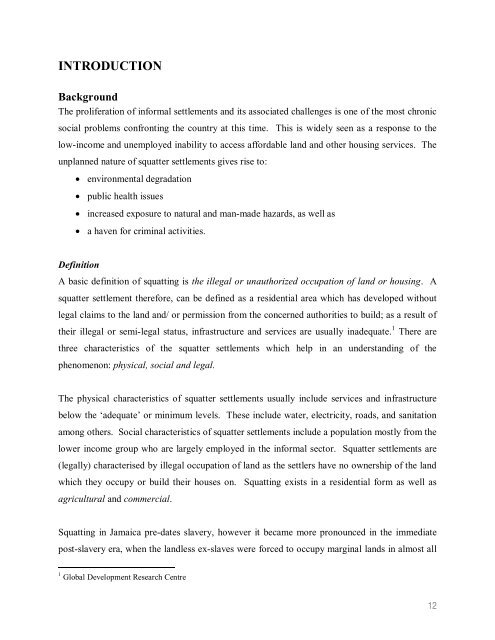Rapid Assessment of Squatting Report (NOTE: LARGE FILE)
Rapid Assessment of Squatting Report (NOTE: LARGE FILE)
Rapid Assessment of Squatting Report (NOTE: LARGE FILE)
You also want an ePaper? Increase the reach of your titles
YUMPU automatically turns print PDFs into web optimized ePapers that Google loves.
INTRODUCTION<br />
Background<br />
The proliferation <strong>of</strong> informal settlements and its associated challenges is one <strong>of</strong> the most chronic<br />
social problems confronting the country at this time. This is widely seen as a response to the<br />
low-income and unemployed inability to access affordable land and other housing services. The<br />
unplanned nature <strong>of</strong> squatter settlements gives rise to:<br />
environmental degradation<br />
public health issues<br />
increased exposure to natural and man-made hazards, as well as<br />
a haven for criminal activities.<br />
Definition<br />
A basic definition <strong>of</strong> squatting is the illegal or unauthorized occupation <strong>of</strong> land or housing. A<br />
squatter settlement therefore, can be defined as a residential area which has developed without<br />
legal claims to the land and/ or permission from the concerned authorities to build; as a result <strong>of</strong><br />
their illegal or semi-legal status, infrastructure and services are usually inadequate. 1 There are<br />
three characteristics <strong>of</strong> the squatter settlements which help in an understanding <strong>of</strong> the<br />
phenomenon: physical, social and legal.<br />
The physical characteristics <strong>of</strong> squatter settlements usually include services and infrastructure<br />
below the ‘adequate’ or minimum levels. These include water, electricity, roads, and sanitation<br />
among others. Social characteristics <strong>of</strong> squatter settlements include a population mostly from the<br />
lower income group who are largely employed in the informal sector. Squatter settlements are<br />
(legally) characterised by illegal occupation <strong>of</strong> land as the settlers have no ownership <strong>of</strong> the land<br />
which they occupy or build their houses on. <strong>Squatting</strong> exists in a residential form as well as<br />
agricultural and commercial.<br />
<strong>Squatting</strong> in Jamaica pre-dates slavery, however it became more pronounced in the immediate<br />
post-slavery era, when the landless ex-slaves were forced to occupy marginal lands in almost all<br />
1 Global Development Research Centre<br />
12


